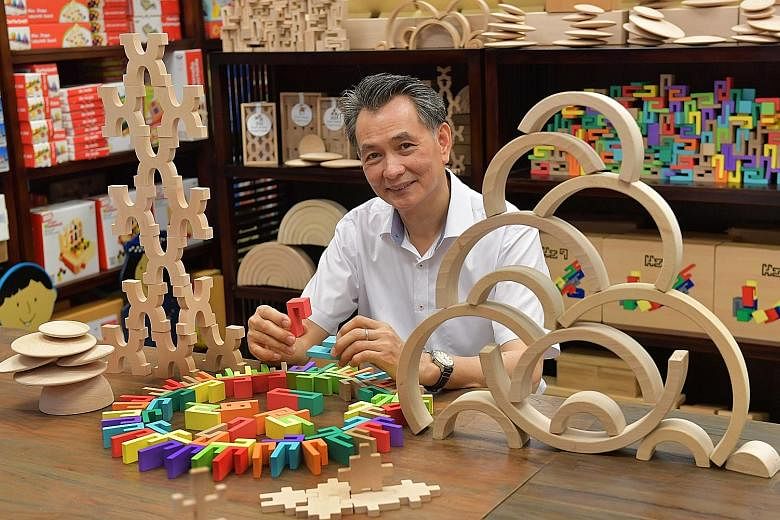His boss once accused him of falsifying the accounts, in front of his colleagues. This was because Mr Gary Seow, now 57, could not key in sales figures and targets correctly.
From a young age, he struggled to remember and tabulate numbers. As a result, he had to repeat Primary 6 and, later on, retake his business law examinations twice.
Then there is Mr Chua Weng Foo, 50, who is still haunted by a school incident 40 years ago. He was made to parade with a board across his chest screaming that he had failed his spelling tests. He was also called "stupid".
Both are now successful entrepreneurs who did not know they struggled for 40 years because of dyslexia. Dyslexia is characterised as a reading disorder in which the brain has trouble properly processing language, making it difficult to spell, read quickly and write.
But there appears to be a well-established link between dyslexia and entrepreneurship, according to research. For instance, Professor Julie Logan, emeritus professor of entrepreneurship at the Cass Business School in London, released a report in 2007 that found that about 35 per cent of entrepreneurs in the United States show signs of dyslexia, while the figure for Britain was 20 per cent. She then compared the traits, attributes and early experiences of people who were identified as dyslexic with a sample of entrepreneurs who were not dyslexic.
Ms Deborah Hewes, head of publicity and publications at the Dyslexia Association of Singapore (DAS), has just embarked on research to find out if this is the case in Singapore too. She will identify the incidence of dyslexia among Singaporean entrepreneurs as part of her master's degree in special educational needs. It will be completed next year.
Said Ms Hewes: "While we understand a great deal about the experiences of children with dyslexia, we are still largely unaware of the experiences of dyslexic adults in the workforce. Too few people understand the contribution to the economy made by dyslexic people."
Singapore's founding prime minister, the late Mr Lee Kuan Yew, was among notable people with dyslexia. He revealed he had dyslexia in 1996 and wrote about his struggles to learn the Chinese language in a book entitled My Lifelong Challenge.
After failing at several sales and purchasing jobs, Mr Seow started his own business in educational toys and learning resources. The company, KYDZ International, has since expanded to cater to the region. Sales volumes have jumped threefold over the last decade.
Mr Chua had been the chief executive officer of several publicly listed European software and service companies for 15 years and now owns and directs three of his own companies.
So what is it about dyslexia and entrepreneurship?
Dyslexics were more likely than non-dyslexics to delegate authority and excel in oral communication and problem solving, and were twice as likely to own two or more businesses, according to the 2007 study conducted by Prof Logan, the international expert on the topic.
Prof Logan said a child who chronically fails standardised tests, for instance, must become comfortable with failure. Being a slow reader forces one to extract only vital information, so the person is focused on getting right to the point. Dyslexics are also forced to trust and rely on others to get things done - an essential skill for anyone working to build a business.
Said Mr Seow: "I tell my wife that dyslexia is my gift. As learning is so hard for me, it forces me to think out of the box and I find that the designs of my new toys in my head move faster than reading letters."
He added: "I have problems with accounts and spreadsheets so I am happy to delegate them to my staff. I prefer to listen to someone explaining a problem to me than read 30 pages describing the issue."
He was formally diagnosed with dyslexia in 2007, after a professional from DAS advised him to be assessed for it.
For Mr Chua, it is because he grew up feeling inadequate and viewing others as "geniuses" that he learnt how to depend, recognise and leverage on the strengths and talents of others. "In coping with the condition, I learnt to do things differently and attract people who can do a better job than me," said Mr Chua.
He realised he had dyslexia only when two of his children - one of them is YouTube star Dr JiaJia - were diagnosed with it and he recognised that he had similar signs and symptoms.
Globally, famous dyslexic entrepreneurs who created hugely successful businesses include Virgin Atlantic Airways founder Richard Branson and Ikea founder Ingvar Kampard.
Mr Lee Siang, chief executive of DAS, said: "Highlighting that there may be a high percentage of entrepreneurs who are dyslexic...may help to remove the stigma surrounding it."


